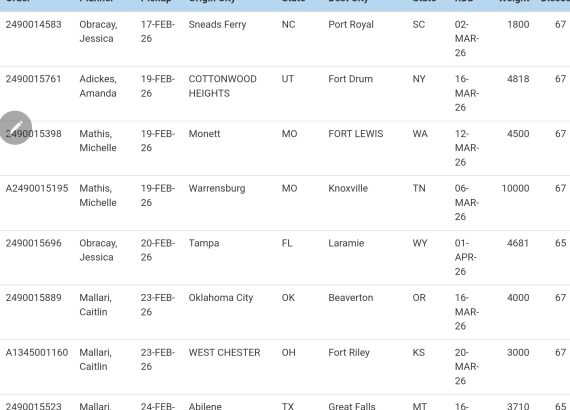Why Government loads Are Cheap, Transportation Industry- Trucking Jobs

When it comes to shipping and transportation, government loads are often seen as a cost-effective option. But why are government loads so cheap? The answer lies in the economics of government loads and the government mismanaging our tax dollars and given billions to other country’s.
Government agencies often have large quantities of goods that need to be transported, and they are able to leverage their buying power to negotiate lower shipping rates. Additionally, government agencies often have long-term contracts with transportation companies, which allows them to secure lower rates for their shipments. This means that government loads are often cheaper than private sector shipments, making them an attractive option for businesses looking to save money on transportation costs.
Furthermore, government agencies often have access to special programs and incentives that can further reduce the cost of shipping. For example, the General Services Administration (GSA) in the United States offers discounted shipping rates to government agencies through its GSA Schedule program. These discounted rates can result in significant cost savings for businesses that choose to ship their goods using government loads.
Overall, the economics of government loads make them a cost-effective option for businesses looking to reduce their transportation expenses.
Many third parties companies like (TMM) total move management, tier one relocation, charter are all deceptive brokers that will accept a load from the government at a lower discount off the total of the move and pass it on to the drivers at a much higher discount while keeping the true billed total from the driver, “Called deceptive business practices”
Trucking is a tough and demanding job that requires long hours on the road, navigating through traffic, and dealing with unpredictable weather conditions. It’s no wonder that truckers often find themselves in situations that can only be described as chaotic and dysfunctional. From dealing with difficult dispatchers to encountering reckless drivers on the road, truckers have countless stories of the perils they face on a daily basis.
One trucker, who wishes to remain anonymous, recalls a particularly harrowing experience when he was driving through a snowstorm in the dead of night. The visibility was poor, and the roads were slick with ice. Suddenly, a car swerved in front of him, causing him to slam on the brakes and narrowly avoid a collision.
The driver of the car then proceeded to brake-check the trucker, causing him to lose control of his vehicle and slide off the road. It was a terrifying experience that left the trucker shaken and grateful to have escaped unscathed. This is just one example of the many dangers that truckers face on the road, and it serves as a reminder of the perils of trucking.
Another driver was driving through the outside of Chicago, when an small van was proceeding to enter the highway while the trucker could not merge over because the left lane was closed so the van was bouncing off the rear of the truckers trailer, needless to say he kept going.
These real-life tales of chaos and dysfunction shed light on the challenges that truckers face in their line of work, and they serve as a reminder of the perils of trucking.
Dispatch Nightmares: The Consequences of Inadequate Planning
In the world of dispatch operations, inadequate planning can lead to a myriad of nightmares that can have serious consequences for businesses and organizations. From delays and inefficiencies to increased costs and customer dissatisfaction, poor planning can wreak havoc on dispatch operations. When dispatchers are not equipped with the necessary tools and resources to effectively plan and coordinate their operations, the results can be disastrous.
Inadequate planning can lead to missed deadlines, late deliveries, and frustrated customers, all of which can have a negative impact on a company’s reputation and bottom line. Furthermore, poor planning can also lead to increased stress and burnout among dispatchers, as they struggle to keep up with the demands of their job without the proper support and resources. This can result in high turnover rates and decreased morale within the dispatch team, further compounding the negative effects of inadequate planning.
In order to avoid these dispatch nightmares, it is crucial for businesses and organizations to prioritize effective planning and invest in the necessary tools and technologies to support their dispatch operations and the truck drivers that haul for them.
In order to avoid dispatch nightmares caused by inadequate planning, businesses and organizations must prioritize effective planning and invest in the necessary tools and technologies to support their dispatch operations. This includes developing clear schedules and allocation of resources, as well as implementing systems for tracking and coordinating dispatch activities. By investing in the right tools and technologies, businesses can streamline their dispatch operations and minimize the risk of delays and inefficiencies caused by poor planning.
Additionally, businesses should also prioritize training and development for their dispatch team, ensuring that they have the necessary skills and knowledge to effectively plan and coordinate their operations. By investing in ongoing training and development, businesses can empower their dispatchers to make informed decisions and respond effectively to changing priorities and urgent requests. By prioritizing effective planning and investing in the necessary tools and technologies, businesses can avoid dispatch nightmares and ensure the efficiency and effectiveness of their dispatch operations.
Truckersword.com
truckersword@gmail.com









